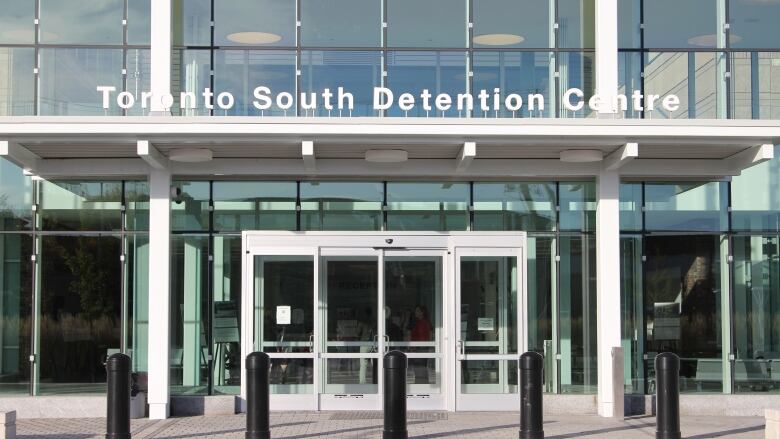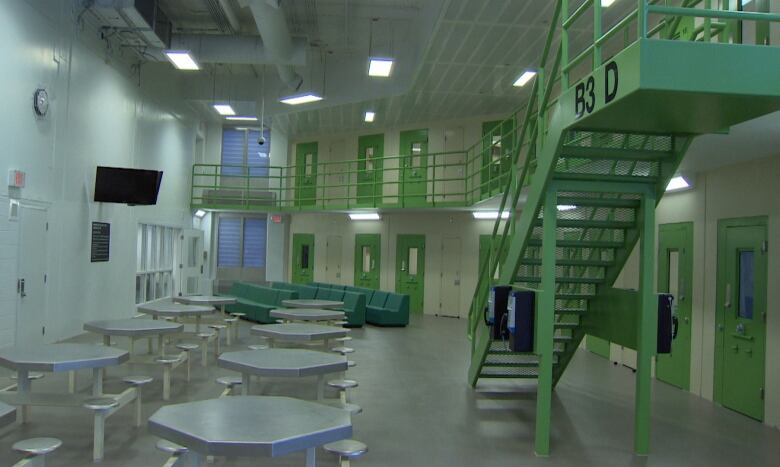Inmate with COVID-19 admitted to Toronto South jail after testing positive
The inmate told jail staff himself that he tested positive and entered the prison wearing a mask: OPSEU

An inmate was admitted to Ontario's largest jailafter testing positive for COVID-19, just daysafter sources told CBC News a guard at the same facility was infected with the virus.
The inmate was a new admission to the Toronto South Detention Centre in Etobicoke, thesecond-largest jail in Canada, whichhouses about1,500 inmates.
The inmate himself notified jail staff that he had tested positive for the virus and entered the facility wearing a mask, Chris Jackel, chair of the Ontario correctionsdivision for the Ontario Public Service EmployeesUnion (OPSEU) told CBC News.
"He was very forthcoming," Jackel said, adding staff immediately donned protective equipment for themselves and took protective measures to isolate the inmate.
The Ministry of the Solicitor General was not aware of the case until it was notified by public health officials, a spokesperson said.
'There is no risk of spread'
"Upon admission, the ministry was made aware by local public health that the inmate was identified as a possible COVID-19 related case and was immediately placed in isolation," Brent Ross, ministry spokesperson wrote in an email to CBC News.
"TSDC has maintained operational protocols related to infection prevention and control," Rossadded. "At no time, during admission or during the time in custody have the isolation protocols been breached."
Who knows how fast it will spread once we have an outbreak inside?- Chad Oldfield
The Solicitor General's ministrycould not say if the inmate and guard's caseswere related. It could also not say when the inmate underwent testing for the virus, but said "all appropriate steps" have been taken to protect jail staff and other inmates.
At a news conference Thursday, Ontario's associate medical officer of health said Toronto Public Health had identified the individual as a presumptive case and that all the appropriate measures in place when he was transferred.
"Given that all the appropriate measures were taken, there is no risk of spread" to the jail population, Yaffe said.
For days, staff not made to quarantine after travel: guards
News of the confirmed case comes just days after several correctional officers contacted CBC News to raise concerns about jail staff being expected to report for work even after returning from travel, as long as they weren't experiencing symptoms of COVID-19.
A source told CBC News the guard who tested positive at Toronto South had travelled to England before returning to work. The guard worked in the admitting and discharge areaand would have been in contact with inmates going to and from court appearances, along with staff.
Jail staff told CBC News that, for days, staff were not directed to quarantine after travel.
"This included front-line staff and managers that deal with vulnerable people in our care," saidAdamWiltshire, a correctional officer at Penetanguishene.

That changed on Thursday, when the Ontario Public Service sent a memo to staff telling them to go into isolationfor 14 days if they had travelled outside the country.
Province takes new measures to reduce spread
Anyone admitted to one of Ontario's correctional facilities is subject to screening measures for respiratory illness in keepingwith guidance from public health officials, the ministry says. Inmates also receive care "as required" during incarceration, it added.
"If an outbreak of any communicable disease occurs or is suspected, institution officials take immediate precautionary containment measures in accordance with operating procedures, including notifying the local Medical Officer of Health, and provincial health professionals.
"Institution health care staff working collaboratively and under the direction of the local Medical Officer of Health manage the situation, including containment strategies such as medical isolation."
Last week, Ontario implemented new measures to protect against the spread of COVID-19 in jails. Theseinclude allowing inmates to servetime on weekends and temporary absences from custody.
Correctional services have the option to issue temporary absences beyond the 72-hour maximum andthose granted temporary absenceswill not have to go a jail every weekend, the ministry said on Friday.
'Urgent need for Ontario to reduce' jail population
However, several guards have told CBC News they want to see further measures, including temperature checks for anyone entering a correctional facility and an increase insanitization.
"Who knows how fast it will spread once we have an outbreak inside?"Chad Oldfield, vice-chair with the Ministry of Employee Relations Committee said.
Justin Pich, associate professor of criminology at the University of Ottawa,says the case underscores the urgent need for Ontario to reduce the number of prisonersin its jailsand use means other than arrest when there isn't an immediate risk to public safety.
"The evidence that imprisonment undermines public health and community safety is robust and incontrovertible. To limit the spread of COVID-19 behind and beyond jail walls, the Government of Ontario needs to take additional measures to reduce the flow of people into its prisons and to take steps to release as many prisoners from custody as is currently safely possible to do,"Pich said.
Doing that, he said, could free up the more than $200 that it costs to keep an inmate in custody per day, which could be redirected toward helping them transition into the community.
Pichalso called on police forces to use discretion to avoid arrests where there is no immediate risk to publicsafety, ease constraints on issuing bail and review the cases of inmates in pre-trial detention.












_(720p).jpg)


 OFFICIAL HD MUSIC VIDEO.jpg)
.jpg)



























































































